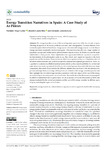Mostrar o rexistro simple do ítem
Energy Transition Narratives in Spain: A Case Study of As Pontes
| dc.contributor.author | Singh Garha, Nachatter | |
| dc.contributor.author | García-Mira, Ricardo | |
| dc.contributor.author | González-Laxe, Fernando | |
| dc.date.accessioned | 2022-12-29T09:38:57Z | |
| dc.date.available | 2022-12-29T09:38:57Z | |
| dc.date.issued | 2022-09-07 | |
| dc.identifier.citation | Singh Garha, N.; Garcia Mira, R.; González-Laxe, F. Energy Transition Narratives in Spain: A Case Study of As Pontes. Sustainability 2022, 14, 11177. https://doi.org/10.3390/su141811177 | es_ES |
| dc.identifier.issn | 2071-1050 | |
| dc.identifier.uri | http://hdl.handle.net/2183/32243 | |
| dc.description.abstract | [Abstract] The energy transition is one of the most important processes of the last decade in Spain, affecting all aspects of life (social, political, economic and demographic). Its main objective is to eventually replace the fossil-fuel-based energy matrix with renewable energy sources to avoid climate change and meet sustainable development goals. This transition has affected a large number of population groups and institutions in carbon-intensive regions such as As Pontes, who are the main stakeholders in this process. These stakeholders have generated different narratives around the implementation of decarbonization policies and their short- and long-term impacts on the local population and the territory. These narratives affect the acceptance and pace of implementation of decarbonization measures and policies adopted by national and regional governments. Based on a qualitative analysis of published material (press articles, policy reports published by central and regional governments, reports published by environmental groups, financial institutions and large companies), this article first identifies the different stakeholders involved in the decarbonization process and maps them according to their power and interest in the energy transition process and then highlights the prevalent energy transition narratives, with their impact on the pace of the energy transition in Spain, focusing on the case of As Pontes. The results show that the narratives propagated by different stakeholders have a great impact on the acceptance of the decarbonization policies and measures adopted by the central government and the pace of the energy transition in different parts of Spain, including the region of As Pontes. | es_ES |
| dc.language.iso | eng | es_ES |
| dc.publisher | MDPI Open Access Journals | es_ES |
| dc.relation | info:eu-repo/grantAgrement/EC/H2020/883947 | es_ES |
| dc.relation.uri | https://doi.org/10.3390/su141811177 | es_ES |
| dc.rights | Atribución 3.0 España | es_ES |
| dc.rights | Atribución 3.0 España | es_ES |
| dc.rights.uri | http://creativecommons.org/licenses/by/3.0/es/ | * |
| dc.subject | Energy transition | es_ES |
| dc.subject | Carbon-intensive regions | es_ES |
| dc.subject | Narrative approach | es_ES |
| dc.subject | Stakeholder mapping | es_ES |
| dc.subject | As Pontes | es_ES |
| dc.title | Energy Transition Narratives in Spain: A Case Study of As Pontes | es_ES |
| dc.type | info:eu-repo/semantics/article | es_ES |
| dc.rights.access | info:eu-repo/semantics/openAccess | es_ES |
| UDC.journalTitle | Sustainability | es_ES |
| UDC.volume | 14 | es_ES |
| UDC.issue | 18 | es_ES |
| UDC.startPage | 11177 | es_ES |
Ficheiros no ítem
Este ítem aparece na(s) seguinte(s) colección(s)
-
GI-GRIPA - Artigos [18]






